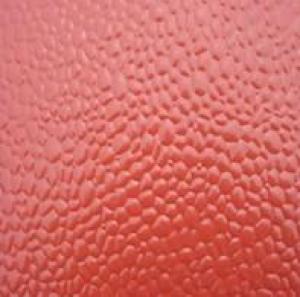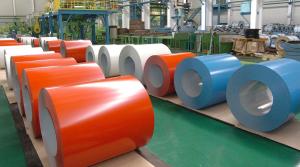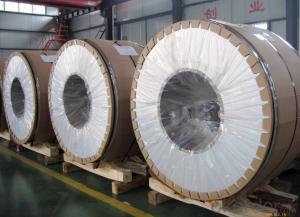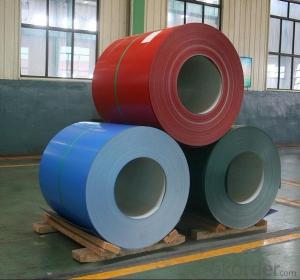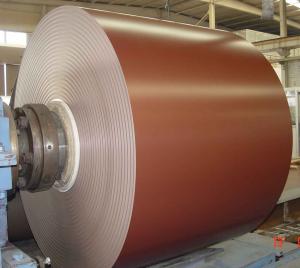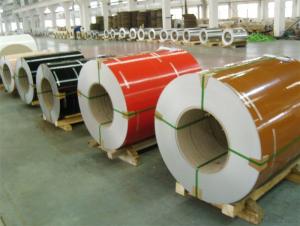PVDF Coated Aluminum Coil Painting - 5XXX
- Loading Port:
- China Main Port
- Payment Terms:
- TT OR LC
- Min Order Qty:
- -
- Supply Capability:
- -
OKorder Service Pledge
OKorder Financial Service
You Might Also Like
Product Description:
1 Specifications of PVDF Coated Aluminum Coil/Sheet
Alloy | AA1050,AA1060, AA1070, AA1100, AA3003, AA3004, AA3005, AA3105, AA5005, AA5052, AA5754, AA5083, AA8011 |
Temper: | H12, H14, H16, H18, H22, H24, H26, H32,HO, F |
Thickness: | 0.10-4.0mm |
Width: | 10mm- 2000mm |
Coating | PVDF |
Painting Thickness | Standard 16-25 microns, max 40 microns |
Color | Acording to Ral colors or customer’s samples |
Standard: | GB/T17748-1999, ASTM, ISO, EU standard |
Special Specification is available on customer’s requirement | |
PVDF(fluorine-carbon) Coating
PVDF(fluorine-carbon) coating :made of fluorine carbon resin, pigment, ester solvent, after high temperature roasting and baking, the paint is solidified to dry film with super weather resistance. PVDF coating also can be classified as traditional PVDF and nanometer PVDF coating.
A.Traditional PVDF Coating, with KYNAR500 PVDF, two or three times for coating and baking, has good properties of anti-acid, anti-alkali and is durable in atrocious weather and environment, keeping 15 years no unwonted fading. In view of these facts, we recommend this panel applied for external wall cladding.
B.Nanometer PVDF Coating, which different with traditional PVDF is the clear coating. It contains nanometer element, which can protect panel from pollution, Because nanometer has self-cleaning effect, It easy to get rid of dust and pollution by raining or water.
- Q: How are aluminum coils tested for mechanical properties?
- Aluminum coils are tested for mechanical properties through a series of standardized tests that evaluate their strength, ductility, and other relevant properties. Some common methods used for testing aluminum coils include tensile testing, hardness testing, and bend testing. Tensile testing is one of the most widely used methods to assess the mechanical properties of aluminum coils. This test involves applying a pulling force to a small section of the coil until it breaks. The force and elongation are measured throughout the test, and these values help determine the coil's ultimate tensile strength, yield strength, and elongation at break. Hardness testing is another important evaluation method that measures the resistance of the aluminum coil to indentation or scratching. It gives an indication of the coil's ability to withstand external forces. Different hardness testing methods, such as Brinell, Rockwell, and Vickers, can be used depending on the specific requirements. Bend testing is performed to assess the ductility and formability of the aluminum coil. This test involves bending the coil to a specific angle or radius and examining it for any signs of cracking, wrinkling, or other defects. It helps determine the coil's ability to undergo forming processes without failure. In addition to these standard tests, other mechanical properties such as fatigue resistance, impact resistance, and fracture toughness can be evaluated through specialized testing methods. These tests provide valuable information about the aluminum coil's performance and help ensure that it meets the required specifications and standards. Overall, a combination of tests is employed to comprehensively assess the mechanical properties of aluminum coils, ensuring they have the necessary strength, ductility, and other properties needed for their intended applications.
- Q: How to sell the super hard 5083aluminum alloy and 5083 aluminum coil?
- Among the alloy which cannot endure heat treatment, 5083 aluminum alloy, a kind of high magnesium alloy, has the properties of intensity, machinability, anti-corrosion, electric-arc weldability and aesthetic after anodizing. The main element of 5083 alloy being magnesium, it is endowed with corrosion resistance, weldablility and moderate intensity, thus applicable to maritime areas such as ships, and cars, airplane weldments, metro light rail, and pressure vessel (such as liquid tank truck, refrigerated truck, refrigerated container), refrigerating equipment, television tower, drilling equipment, transport facility, missile parts, armor and so on.
- Q: The box doesn't tell me. I need to know because my gun range won't allow steel or aluminum cartridges
- First - the only ranges that care - are indoor ranges. And 99.99999% of them do not allow 308 rifle caliber fired indoors!! Second - the range does not care what the case is made out of - they are caring about what the bullet is made out of. Most lead bullets are soft and do not hurt a backstop - steel ones do. You should have included the name of the range - we could have helped you more.
- Q: How are aluminum coils tested for strength and durability?
- Aluminum coils are tested for strength and durability through various methods such as tension testing, hardness testing, and corrosion resistance testing. Tension testing involves subjecting the coils to gradually increasing force to determine their breaking point and tensile strength. Hardness testing measures the coil's resistance to indentation or scratching, providing insight into its durability. Additionally, corrosion resistance testing assesses the coil's ability to withstand environmental factors that may cause deterioration. These comprehensive tests ensure the quality and reliability of aluminum coils in various applications.
- Q: What are the common surface repair methods for aluminum coils?
- Aluminum coils can be repaired using various surface repair methods. Mechanical repair is one of the most commonly used techniques. It involves sanding or grinding the affected area to eliminate corrosion and imperfections. Following this, a filler or putty is applied to even out the surface and create a seamless repair. Once the filler has dried, the repaired section can be sanded again to achieve a smooth finish. Chemical repair is another popular method. It entails utilizing specialized chemicals to eliminate oxidation or corrosion from the aluminum coil's surface. This is done by directly applying the chemical to the damaged area and allowing it to react with the surface, breaking down any corrosion or oxidation. After the chemical has completed its task, the coil is rinsed, dried, and any remaining imperfections are addressed using mechanical repair methods. Heat repair methods can also be employed in certain cases. This involves using a heat gun or torch to heat the damaged portion, making the aluminum soft and malleable. Once heated, the metal can be reshaped or manipulated to remove dents or deformations. Careful control of the heat is necessary to prevent further damage to the coil. Lastly, anodizing is a commonly used surface repair method. It involves applying a protective coating to the coil's surface, which not only repairs any damage but also provides additional protection against future corrosion or oxidation. Anodizing is often chosen for more extensive repairs or when the coil will be exposed to harsh environments. The choice of surface repair method for aluminum coils depends on the extent of the damage and the desired outcome. It is advisable to consult with a professional or follow the manufacturer's guidelines to ensure optimal results and extend the coil's lifespan.
- Q: Can aluminum coils be used for automotive body panels?
- Yes, aluminum coils can indeed be used for automotive body panels. In fact, aluminum is becoming increasingly popular in the automotive industry due to its many advantages. Aluminum is lightweight, which can contribute to improved fuel efficiency and overall performance of the vehicle. Additionally, aluminum has excellent corrosion resistance properties, making it a durable choice for automotive body panels. Moreover, aluminum can be easily formed and molded, allowing for intricate designs and better aerodynamics. Overall, the use of aluminum coils for automotive body panels is a viable option that offers numerous benefits.
- Q: Can the 5-10cm thick paper sleeve inside the scrapped aluminum coil be sliced? Now we use knife which is much troublesome.
- You can use Long Men Rolling Mill to slice directly.
- Q: Who knows about how much money can be sold in a three metre high similar aluminum door?
- How wide is it, mainly to see the door you have multiple components, scrap is generally about 10 yuan a kilogram!
- Q: This question asks for the methods and practices to keep aluminum coil in good condition and prevent damage or corrosion.
- <p>To maintain aluminum coil, follow these steps: Store the coil in a dry, clean environment to prevent moisture and dirt from causing rust. Keep it away from corrosive substances. Regularly inspect the coil for any signs of damage or corrosion, and address any issues promptly. Handle the coil carefully to avoid scratches or dents. Use protective coverings during transportation to prevent damage. Keep records of the coil's condition and maintenance history to track its performance over time. Regular maintenance will help extend the life of the aluminum coil and maintain its quality.</p>
- Q: What is the typical conductivity of aluminum coils?
- Aluminum coils exhibit a relatively high typical conductivity, with a range of values between 34 and 38 million Siemens per meter (MS/m) at room temperature. Renowned for its exceptional electrical conductivity, aluminum finds extensive application in diverse electrical uses such as power transmission lines, electrical conductors, and coils. This notable conductivity enables the smooth and efficient flow of electric current through aluminum coils, rendering them apt for dependable and efficient electricity conduction.
Send your message to us
PVDF Coated Aluminum Coil Painting - 5XXX
- Loading Port:
- China Main Port
- Payment Terms:
- TT OR LC
- Min Order Qty:
- -
- Supply Capability:
- -
OKorder Service Pledge
OKorder Financial Service
Similar products
Hot products
Hot Searches
Related keywords
